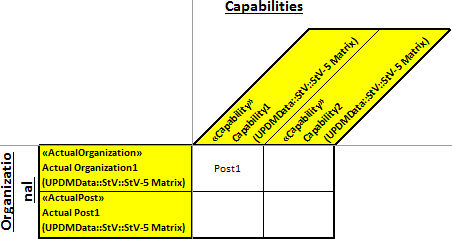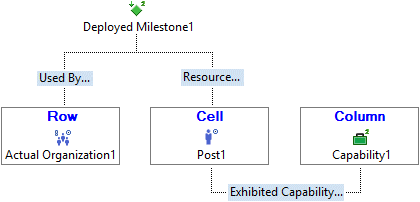NCV-5 Capability to organisation deployment mapping (UPDM - NAF aliases)

Creation
To create an NCV-5 Capability to Organisation Deployment Mapping:
• Right-click the
Architectural Description or
Service Description that is to own the NCV-5 Capability to Organisation Deployment Mapping, point to New, point to Matrix/Table, point to NAF, and then click NCV-5 Capability to Organisation Deployment Mapping.
When you open an NCV-5 Capability to Organisation Deployment Mapping, Modeler can generate it as HTML for viewing in your Internet browser, or generate it as a spreadsheet for viewing in Microsoft Excel. To specify how matrices and tables are opened for a model: in the Packages pane, right-click the Model, point to > , click Matrix/Table Generation Format, and then select HyperTextMarkupLanguage_HTML or Excel_XLS.
Each time you open an NCV-5 Capability to Organisation Deployment Mapping, Modeler generates the product using the latest data from the model.
Purpose
On an NCV-5 Capability to Organisation Deployment Mapping:
• View which
Capability elements are exhibited by system resources and then deployed for usage by
Actual Organization and
Actual Post elements through the context of a
Deployed Milestone.
A system resource can be a
Capability Configuration,
Organization,
Physical Architecture,
Post,
Resource Artifact,
Responsibility,
Service Access or
Software element.
Elements Shown

The NCV-5 Capability to Organisation Deployment Mapping shows the following elements:
• A row is created for each system
Actual Organization and
Actual Post that is found in the analyzed Packages.
In addition, a row is created for each Actual Organization or Actual Post that deploys a system resource that exhibits a Capability that is found in the analyzed Packages, even if that Actual Organization or Actual Post is outside the scope of the analyzed Packages.
• A column is created for each
Capability that is found in the analyzed Packages.
In addition, a column is created for each Capability that is exhibited by a system resource and then deployed for usage by an Actual Organization or Actual Post that is found in the analyzed Packages, even if that Capability is outside the scope of the analyzed Packages.
• The name of a system resource is shown in a cell when the cell's associated Capability is exhibited by that system resource and then deployed for usage by the cell's associated Actual Organization or Actual Post.
For information about setting up these relationships, see the example that follows.
Analyzed Packages
By default, the NCV-5 Capability to Organisation Deployment Mapping searches for system resource and Capability elements that are contained within the Architectural Description or Service Description that owns the NCV-5 Capability to Organisation Deployment Mapping.
To search for elements from other Architectural Description and Service Description packages: right-click the NCV-5 Capability to Organisation Deployment Mapping, point to Links, and then click Analyzed Packages. From the Links Editor, select the Architectural Description and Service Description packages from which you want to search for elements.
Customizing the Matrix
You can customize the presentation of an NCV-5 Capability to Organisation Deployment Mapping, for example, by changing the row and column labels that are used. For more information about customizing a custom table or matrix, click here
Example
In this example, Architectural Description1 owns NCV-5 Capability to Organisation Deployment Mapping1 and the following elements:
·
Deployed Milestone1, Actual Organization1, Actual Post1, Capability1, Capability2 and the system resource Post1.
We set up Deployed Milestone1 to be used by Actual Organization1: we right-click Deployed Milestone1, point to Links, and then click Used By.
We set up Deployed Milestone1 to use Post1 as a resource: we right-click Deployed Milestone1, point to Links, and then click Resource.
We set up Post1 to exhibit Capability1: we right-click Post1, point to Links, point to Capability, and then click Exhibited Capability.
When generated, NCV-5 Capability to Organisation Deployment Mapping1 appears as follows.

From the generated matrix you can see the following:
·
A row has been created for each Actual Organization and Actual Post in Architectural Description1, that is, Actual Organization1 and Actual Post1.
·
A column has been created for each Capability in Architectural Description1, that is, Capability1 and Capability2.
·
Capability1 is exhibited by Post1 and then deployed for usage by Actual Organization1; shown by Post1 appearing in the cell.

The following sections provide information about how an NCV-5 Capability to Organisation Deployment Mapping is used in the model.
Create an NCV-5 Capability to Organisation Deployment Mapping from
Creates or shows these UPDM elements













